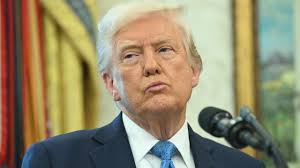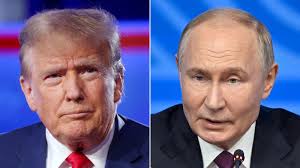As President Donald Trump wraps up the first 100 days of his second term, the mood across the country seems to be shifting—and not in his favor.
For the first time since his re-election, his approval rating has taken a noticeable dip, leaving even some of his loyal supporters questioning his direction, especially when it comes to the economy and trade policies.
A new Daily Mail/J.L. Partners poll shows his approval has slipped nine points in just under two weeks—from a high of 54% to 45%.
While some groups remain supportive, concerns are growing louder over whether Trump’s signature policies are actually helping Americans, or hurting their wallets.
Tariff Talk Leaves Americans Worried About Their Finances
One of the biggest drivers behind the decline? Tariffs.
Trump’s aggressive push to impose tariffs as part of his international trade agenda may have sounded tough at first, but now, many voters are starting to feel the consequences—and they’re not happy.
Six out of ten Americans now say the economy is either bad or getting worse, including nearly half of Republicans.
A California voter who backed Trump in 2024 summed it up bluntly: “He’s pushing things like tariffs that will hurt us economically in the future.”
Loyalty Still Runs Deep Among His Core Supporters
Despite the growing unease, Trump still enjoys solid backing from key groups. Men, white voters, and Republicans continue to support him, with over 50% still rating his performance positively.
But even among those groups, cracks are beginning to show.
This is the first time since his second inauguration that voters have openly said they’re feeling more negative about the direction of the administration.
His tariff policies, in particular, have stirred backlash globally and caused some instability in the financial markets.
Trump Brushes Off the Numbers as “Fake” While Defending His Record
Unsurprisingly, Trump isn’t taking the poll results lying down. On Monday night, he dismissed any negative ratings as “fake” and insisted, “We are doing GREAT, better than ever before.”
And to be fair, his second term has been anything but quiet.
From day one, Trump has kept the Oval Office busy, signing executive orders at a breakneck pace and reshaping government policies in ways that defy decades of precedent.
Musk, Mugshots, and Mounting Controversies
In a move that raised eyebrows, Elon Musk’s DOGE initiative has been wielding the budget axe to slash federal spending.
And on Monday, the White House lined its driveway with mugshots of arrested migrants to promote Trump’s immigration crackdown—a dramatic visual message to the public.
Trump has also rattled global allies with unpredictable diplomatic comments, like threatening to “take over” Greenland, Canada, and even the Panama Canal.
His approach to international relations—particularly in talks with Ukraine’s President Zelensky—has left many wondering what the game plan really is.
Voters Say Tariffs Are the Biggest Misstep, Border the Biggest Win
When asked to name Trump’s biggest mistake so far, “tariffs” topped the list.
But not everything has been a loss—voters credited his border crackdown as his most successful initiative.
Overall, 55% of registered voters now disapprove of the job he’s doing, with the nine-point fall mostly tied to confusion and dissatisfaction surrounding his trade strategy.
Many Americans feel there’s no clear explanation or consistent vision behind the tariff policies anymore.
The Honeymoon Is Over as Voters Express Regret
James Johnson, the pollster from J.L. Partners, explained the shift in sentiment this way: “The honeymoon period is officially over.”
He said voters aren’t necessarily against tariffs in theory—but they’re frustrated by what appears to be Trump’s wavering stance and lack of clarity.
And those doubts are becoming personal.
Voters are worried about their savings, their grocery bills, and the cost of living in general.
Supporters Who Once Had High Hopes Now Feel Let Down
Trump was elected again by Americans who felt the economy had left them behind.
After years of inflation and rising gas prices, voters believed he would bring relief.
But now, just 100 days in, some are starting to second-guess that decision.
Forty percent say his return to office has gone worse than they expected, while only 32% think it’s been better.
Among Republicans, though, 60% still feel things are going well.
Interestingly, 56% of all voters say Trump has followed through on his promises—but nearly 60% also describe his leadership as divisive.
Even Supporters Voice Concerns About the Stock Market and Cost of Living
Voters shared a range of concerns in the poll, from Trump’s handling of the war in Ukraine to giving Elon Musk too much power.
Some said their personal finances have taken a hit, and they worry the administration’s plans are disconnected from reality.
“I can’t tell if he’s doing anything to reduce prices,” said a woman from Mississippi.
Another from Maryland added, “Maybe he needs to slow down and focus on what really matters here at home.”
Tariffs Overshadow Even Major Global News
The anxiety over tariffs has become so dominant, voters said it was the biggest story of the past week—even overshadowing the death of Pope Francis.
That’s a sign of just how deeply these economic concerns are resonating.
Some still describe Trump’s first 100 days as “great” or “good,” but just as many are using words like “chaotic” and “confusing” to sum up the start of his second go-around in the White House.
Trump’s Image: Still Strong, But Clearly Shifting
When asked to describe Trump in one word, the most common response was still “great.”
But the overall mood is shifting. Words like “tariffs,” “economy,” and “market” dominated the reasons why some voters are now cooling on the president.
His weakest numbers came from Democrats and Hispanic voters—but what’s striking is that even Republican voices are starting to express doubts, particularly around how the administration’s economic choices are affecting their daily lives.
As the next phase of his presidency begins, it’s clear the road ahead may be bumpier than expected.



